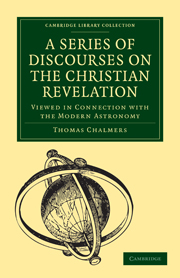Book contents
- Frontmatter
- PREFACE
- Contents
- DISCOURSE I A SKETCH OF THE MODERN ASTRONOMY
- DISCOURSE II THE MODESTY OF TRUE SCIENCE
- DISCOURSE III ON THE EXTENT OF THE DIVINE CONDESCENSION
- DISCOURSE IV ON THE KNOWLEDGE OF MAN'S MORAL HISTORY IN THE DISTANT PLACES OF CREATION
- DISCOURSE V ON THE SYMPATHY THAT IS FELT FOR MAN IN THE DISTANT PLACES OF CREATION
- DISCOURSE VI ON THE CONTEST FOR AN ASCENDENCY OVER MAN, AMONGST THE HIGHER ORDERS OF INTELLIGENCE
- DISCOURSE VII ON THE SLENDER INFLUENCE OF MERE TASTE AND SENSIBILITY, IN MATTERS OF RELIGION
- APPENDIX
DISCOURSE I - A SKETCH OF THE MODERN ASTRONOMY
Published online by Cambridge University Press: 29 August 2010
- Frontmatter
- PREFACE
- Contents
- DISCOURSE I A SKETCH OF THE MODERN ASTRONOMY
- DISCOURSE II THE MODESTY OF TRUE SCIENCE
- DISCOURSE III ON THE EXTENT OF THE DIVINE CONDESCENSION
- DISCOURSE IV ON THE KNOWLEDGE OF MAN'S MORAL HISTORY IN THE DISTANT PLACES OF CREATION
- DISCOURSE V ON THE SYMPATHY THAT IS FELT FOR MAN IN THE DISTANT PLACES OF CREATION
- DISCOURSE VI ON THE CONTEST FOR AN ASCENDENCY OVER MAN, AMONGST THE HIGHER ORDERS OF INTELLIGENCE
- DISCOURSE VII ON THE SLENDER INFLUENCE OF MERE TASTE AND SENSIBILITY, IN MATTERS OF RELIGION
- APPENDIX
Summary
“When I consider thy heavens, the work of thy fingers, the moon and the stars, which thou hast ordained; What is man, that thou art mindful of him? and the son of man, that thou visitest him?”
—Psalm viii. 3, 4.In the reasonings of the Apostle Paul, we cannot fail to observe, how studiously he accommodates his arguments to the pursuits or principles or prejudices of the people whom he was addressing. He often made a favourite opinion of their own the starting point of his explanation; and educing a dexterous but irresistible train of argument from some principle upon which each of the parties had a common understanding, did he force them out of all their opposition, by a weapon of their own choosing—nor did he scruple to avail himself of a Jewish peculiarity, or a heathen superstition, or a quotation from Greek poetry, by which he might gain the attention of those whom he laboured to convince, and by the skilful application of which, he might “shut them up unto the faith.”
Now, when Paul was thus addressing one class of an assembly, or congregation, another class might, for the time, have been shut out of all direct benefit and application from his arguments. When he wrote an Epistle to a mixed assembly of Christianised Jews and Gentiles, he had often to direct such a process of argument to the former, as the latter would neither require nor comprehend.
- Type
- Chapter
- Information
- A Series of Discourses on the Christian Revelation, Viewed in Connection with the Modern Astronomy , pp. 17 - 55Publisher: Cambridge University PressPrint publication year: 2009First published in: 1817

